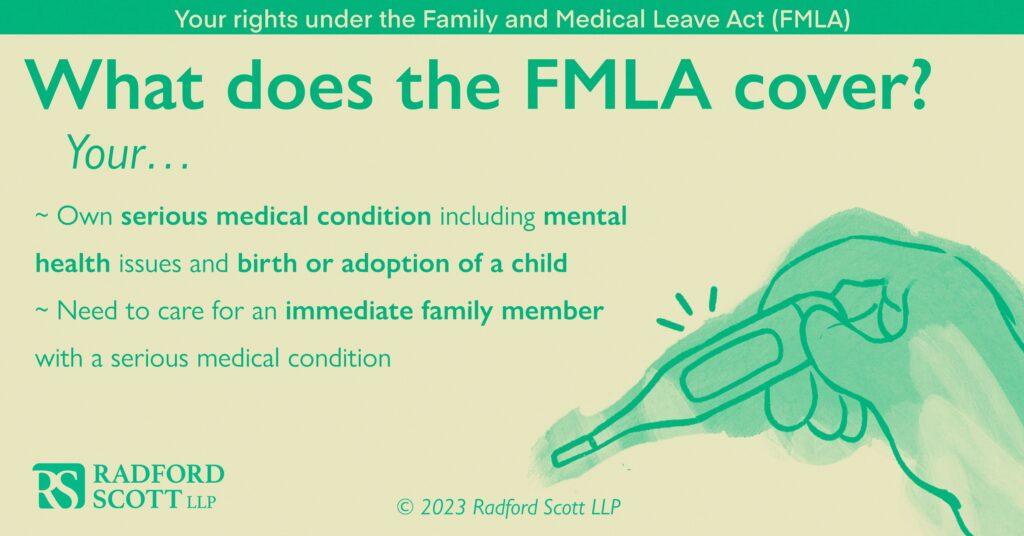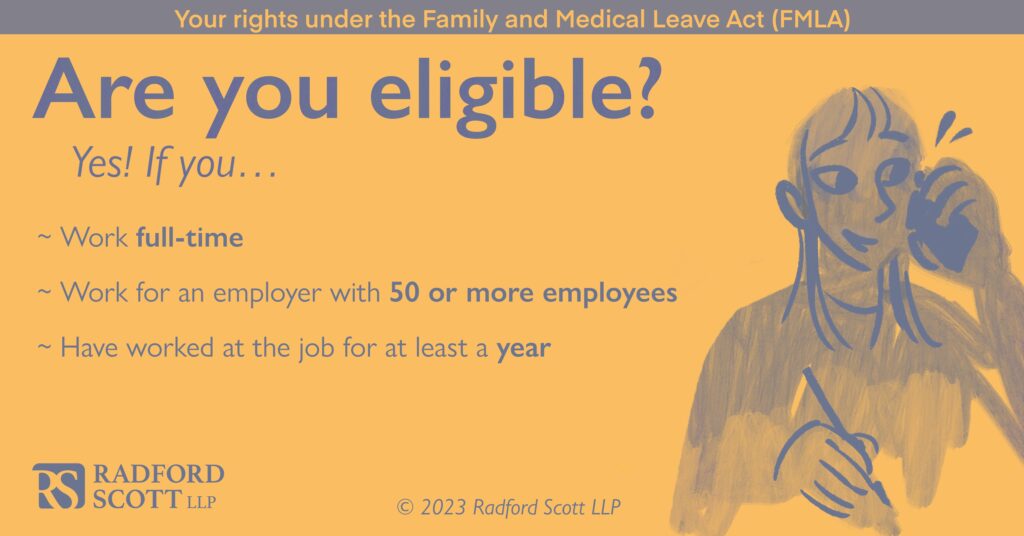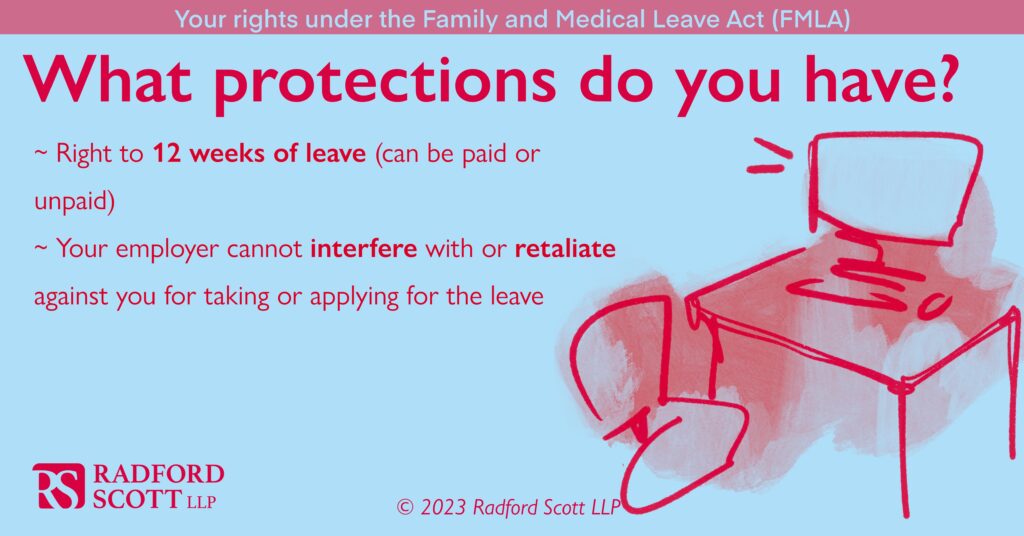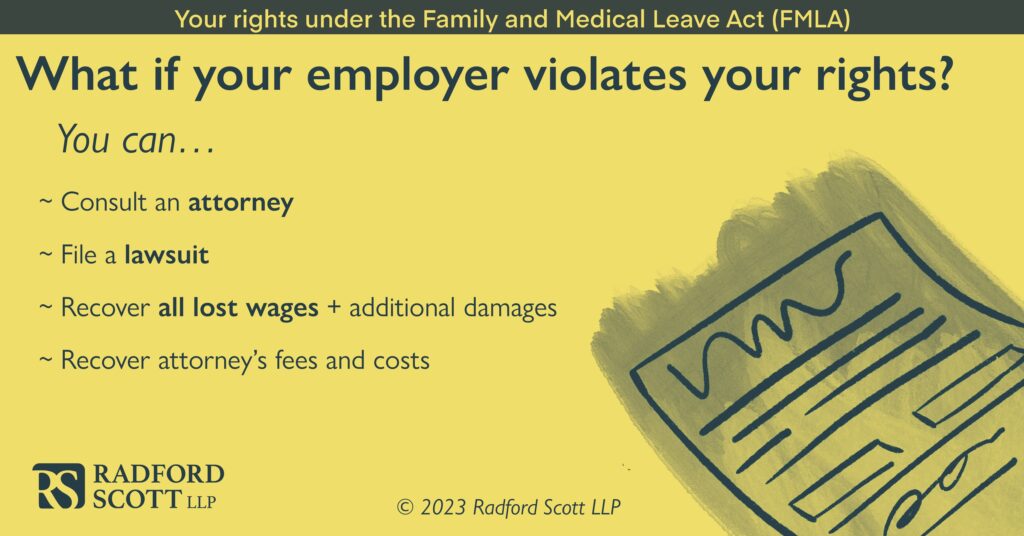At the best workplaces, employers accept and understand that employees have lives outside of their jobs. While it can be difficult to balance overlapping responsibilities, most people make it work.
Sometimes, though, a health issue or life change takes precedence over everything else. Maybe it’s a happy event, like the birth of a child or adoption. Or it’s something less expected, like a car accident injury, a spouse’s cancer diagnosis, or a parent’s broken hip. The Family and Medical Leave Act (FMLA) makes space for employees to get the care they need, or to care for a close family member, without having to choose between their family and their job.

FMLA has its limitations: It’s only available to eligible employees, and it can be unpaid. But employers also sometimes abuse their workers’ FMLA rights, interfering with an employee’s leave request or retaliating against employees who invoke their rights.
So what do you need to know about this federal protection, and what should you do if you think your employer is acting unfairly?

Before you start: Are you eligible for FMLA?
Many workers are surprised to learn they don’t have FMLA protections only after they have a health crisis, share pregnancy news with a boss or request time to care for a family member. Only 56 percent of employees are actually eligible for FMLA leave, according to a brief prepared by Abt Associates.
To be eligible you need to:
- Work for an employer with 50 or more employees, or work for a public agency or an elementary or secondary school (a “covered” employer)
- Have worked at the job for at least 12 months
- Have worked for at least 1,250 hours
- Work for an employer with at least 50 employees within 75 miles
If you’re considering a job at a small firm or a remote position, it can be helpful to check the company’s paid leave and unpaid leave policies since you might not have FMLA eligibility.

Your employer can’t threaten your job
FMLA allows for up to 12 weeks of leave in a 12-month-period of unpaid, job-protected leave for qualifying reasons. During that time, employees can stay on their group health insurance plan (covering their own portion of the premium just as they would while working) and return to the same job—or, at least, to one that’s similar in pay and responsibilities.
Holding open positions sometimes challenges employers, and there are ways to make the request for leave go more smoothly. The U.S. Department of Labor Wage and Hour Division, which administers FMLA, suggests giving employers 30 days’ advance notice when you know something is scheduled, like surgery, an induction or a first chemotherapy treatment. But when you have an urgent need, it’s acceptable to let an employer know as soon as you can.
If your employer denies your family leave, suggests you should work through your medical condition or threatens your job, you’re being treated unfairly.

Your employer can’t ask for your medical records
FMLA covers serious health conditions and major family needs, including:
- The birth, adoption or foster care of a child, within one year of birth or placement
- The care of an employee’s spouse, son, daughter or parent with a serious health condition
- The employee’s own treatment and care during a serious health condition
Military family caregivers are also entitled to FMLA leave, as are active duty service members during deployments.
While your employer may need some documentation to approve your FMLA request, you never have to share medical records, sign waivers allowing your employer to speak directly with your doctor or answer questions about your family history.
Instead, your employer can ask for a medical certification—a document prepared by your health care provider that outlines your medical reasons and estimates how long you’ll require treatment. Medical certifications contain everything an employer would need in order to approve your FMLA without violating your patient privacy.
Your employer can’t deny FMLA for mental healthcare
If you need therapy, inpatient treatment, counseling or other mental healthcare for a qualifying serious condition, your employer can’t make a distinction between physical and mental health needs.
Your employer can’t make you work on leave
FMLA is unpaid leave. If your employer is asking you to work, remain available for questions or otherwise continue to do your job, you’re not being treated fairly.
Your employer must provide an equivalent position upon your return
While employers don’t have to hold open your exact position while you’re on leave, they also can’t switch you to a role with lower pay or fewer responsibilities when you’re back.
Additionally, it’s illegal for employers to retaliate against you for taking FMLA leave. This might include setting you up for failure, giving you poor performance reviews, leaving you out of crucial meetings, changing your work schedule so that you can’t care for your family or even firing you. It’s here where FMLA violations often overlap with discrimination based on protected characteristics, like pregnancy, sex or disability.
Contact Radford & Keebaugh to talk about your FMLA concerns
If you are a covered employee, you have a right to FMLA and its job protections. If your employer has discouraged you from taking FMLA leave, demanded private medical information, threatened to reveal your medical condition or retaliated against you for using your leave, you should speak to an employment lawyer. If your employer has abused your FMLA rights, it’s also possible they’ve discriminated against you.
Contact us today to receive additional information and talk about your situation.
